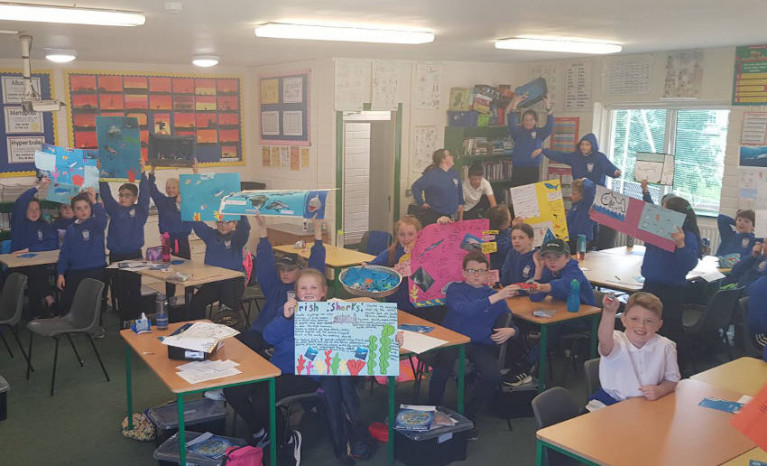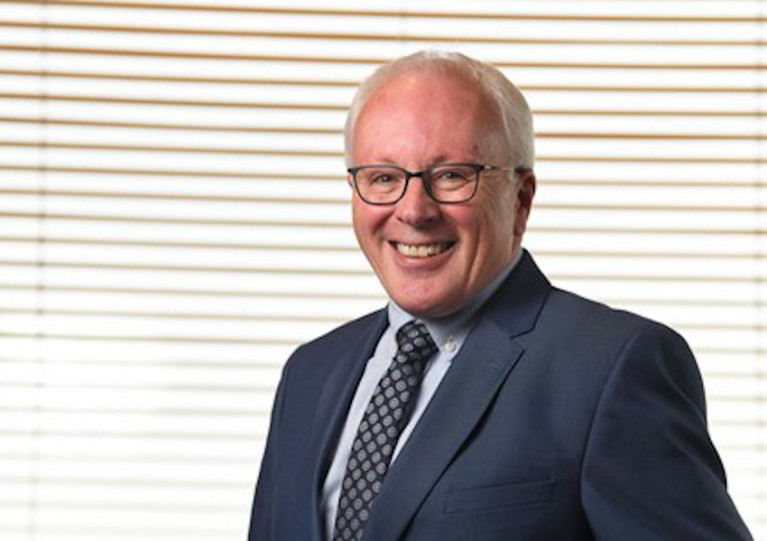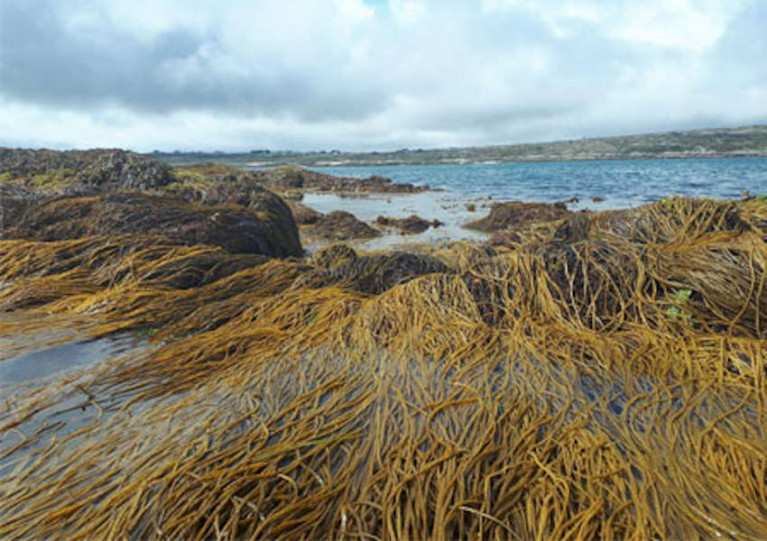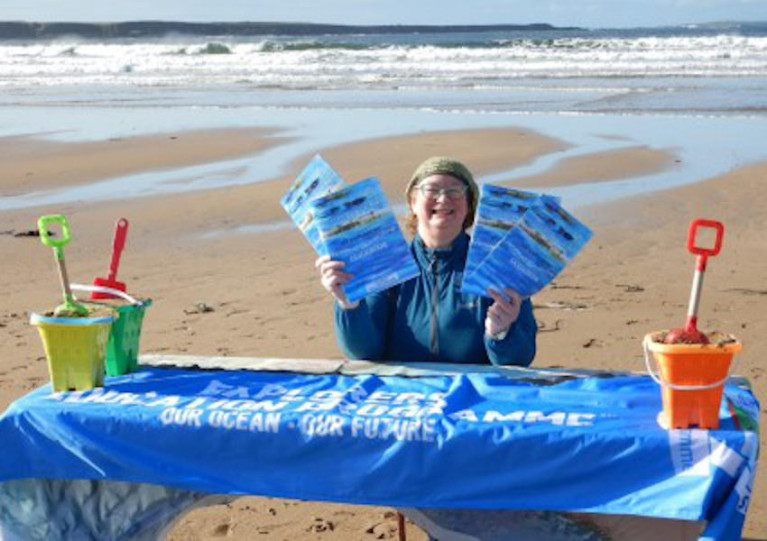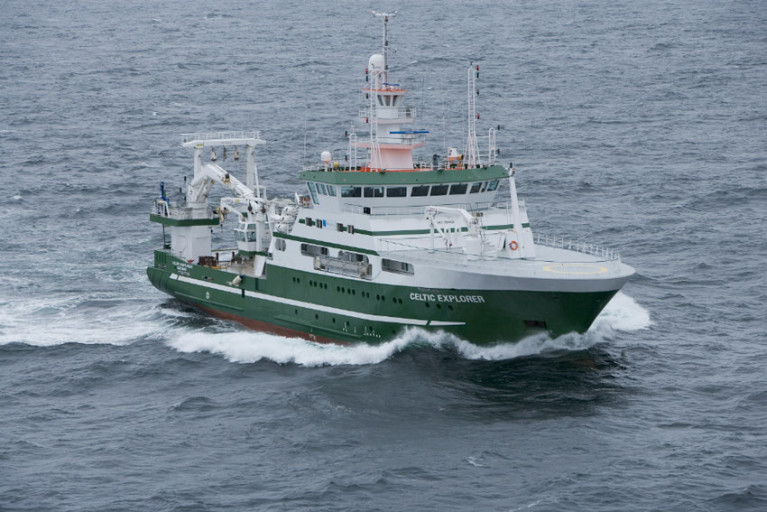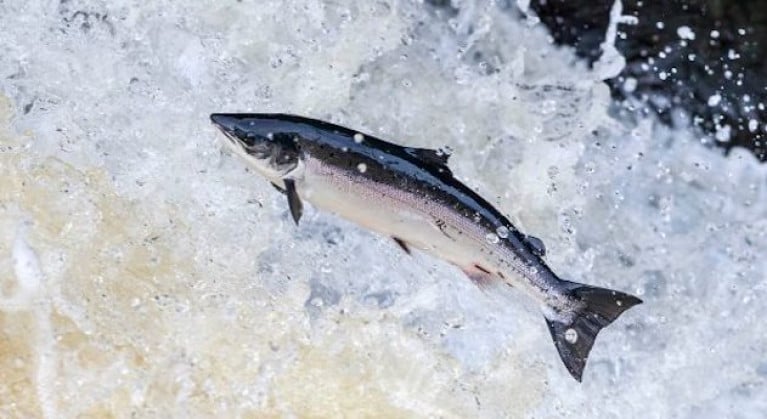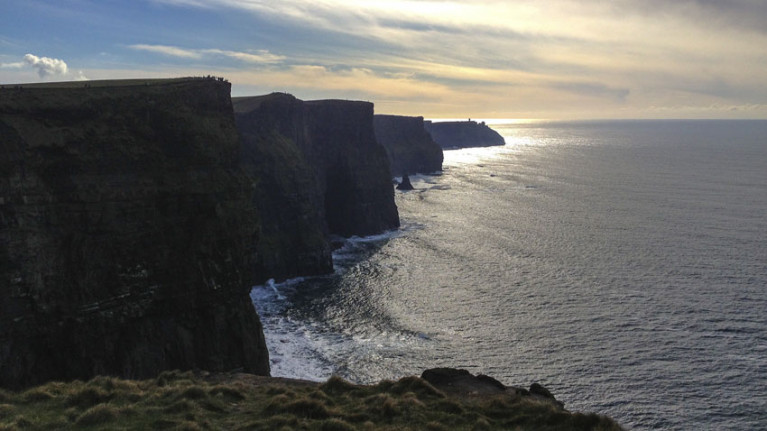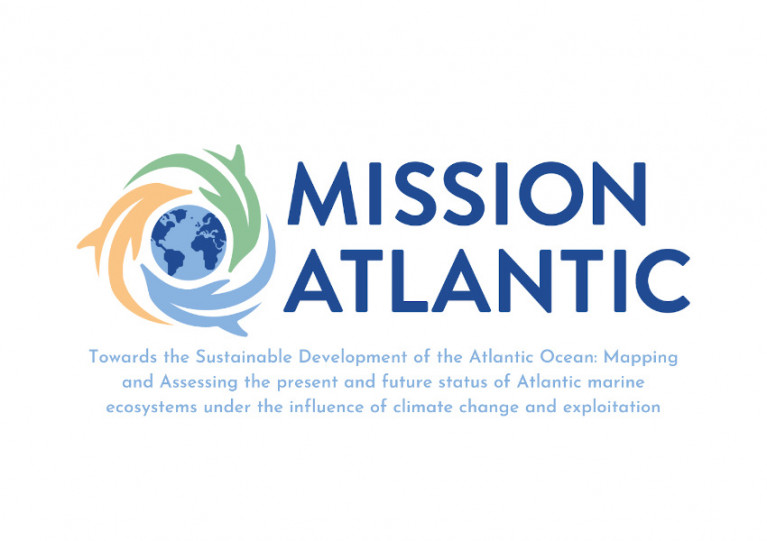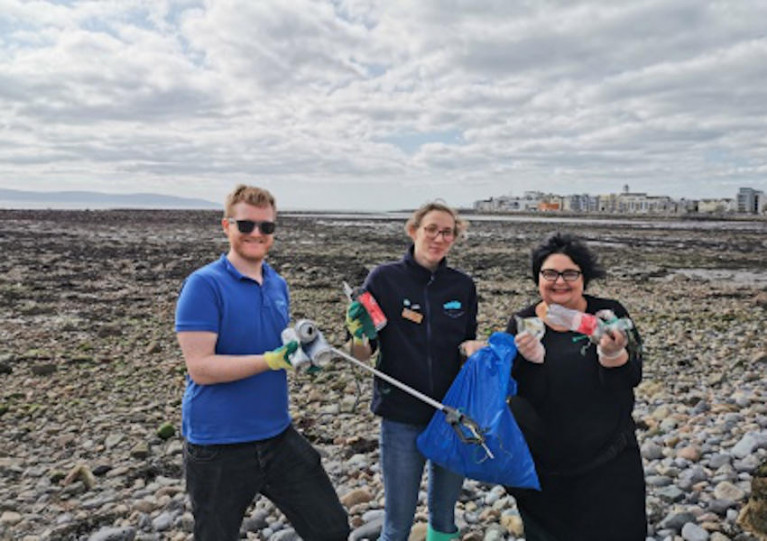Displaying items by tag: Marine Institute
Fifth and sixth class pupils at St Patrick’s National School in Craanford, Co Wexford had the opportunity to share their knowledge of sharks with RTÉ’s children’s news programme news2day this afternoon (Wednesday 4 November).
The youngsters recently took part in a project on the fearsome fish with the Marine Institute’s Explorers Education Programme, learning more about the sharks found in Irish waters and around the world.
Explorers outreach officer Padraic Creedon worked with teacher Jackie Cousins and her class as they were inspired by stories such as the discovery of a rare shark nursery 200 miles off the west coast of Ireland.
“Working with the Wexford class from my Galway base has been one of my highlights this year,” Creedon said.
“Seeing their work, from the shark frame on their classroom door to the detailed sculptures and art work of various Irish sharks created by the students, was fantastic.
“The children’s work showing the basking shark, which is found in Irish waters and the second largest shark in the world, was a particular favourite of mine.
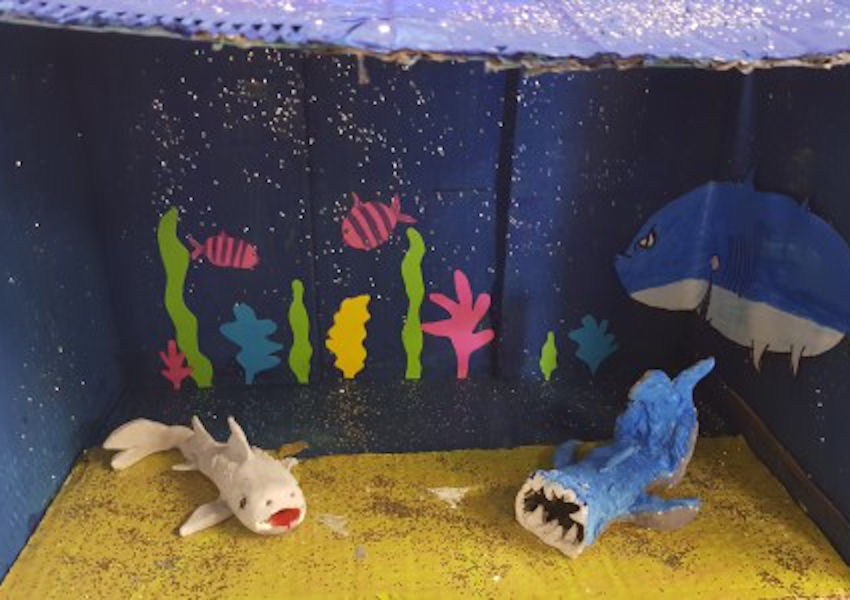 Shark diorama by pupils at St Patrick’s NS | Photo: Padraic Creedon
Shark diorama by pupils at St Patrick’s NS | Photo: Padraic Creedon
“This all highlighted the importance of engaging in ocean exploration and creating ocean champions at primary school level,” added Creedon, who also works at Galway Atlantaquaria.
“Connecting with the children on line and in the class with Padraic generated huge excitement for us all,” said their teacher Jackie Cousins. “The children's enthusiasm to learn about sharks helped us incorporate a range of subjects in the class from science and English to the arts.
“The Explorers approach with the class also gave the children a voice, where they were able to lead the discussion about sharks and what they wanted to learn.
“This sense of collective engagement as well as doing their own research opened up an amazing sense of discovery, where they have excelled and produced some incredible work, from writing facts and stories about sharks to producing a series of posters and artwork.”
Mícheál Ó Scannáil, the news2day presenter who interviewed the class in his home county, was also struck by the children’s enthusiasm for sharks and their ocean habitat.
“We had great fun in Craanford and the kids and Padraic taught me a lot about sharks. I still don't know if I’d hop in the sea with them, though!”
The segment featuring the pupils of St Patricks’s NS begins at 2m40s into today’s edition of news2day on the RTÉ website HERE.
Marine Institute’s Chief Executive Elected to ICES Bureau
The Marine Institute’s chief executive has been elected to the Bureau of the International Council for the Exploration of the Seas (ICES) at the recent annual meeting of its member countries.
Dr Paul Connolly — one of two ICES delegates for Ireland along with Dr Ciaran Kelly, also of the Marine Institute — was voted onto the executive committee of the ICES Council, its principal decision- and policy-making body, at the recent annual meeting of member countries on 21-22 October.
Marine Minister Charlie McConalogue was among those offering their congratulations to Dr Connolly on his new appointment.
“Ireland relies on the work of ICES to support the sustainable use of our seas and oceans and Dr Connolly’s election will further enhance Ireland’s contribution to this valued international organisation,” the minister said.
Marine Institute chairman Dr John Killeen added: “On behalf of the board, I congratulate Dr Connolly on his election by the member countries of ICES to this prestigious and important position.
“The Marine Institute has a long-standing relationship with ICES and regard it as an essential forum for our scientists to collaborate with their international colleagues to deliver impartial advice for our decision makers.”
Dr Connolly has served the ICES community since he was first appointed Irish delegate in 2000, when he took up his role as director of fisheries and ecosystems advisory services at the Marine Institute.
Dr Connolly was elected vice president of ICES in 2003 and served on its board until 2005. He then served as MCAP (Management Committee on the Advisory Process) chair from 2005 to 2008.
He was elected president of ICES from 2012 to 2015, and led the development of the ICES Strategic Plan (2014-2018) which was adopted by 20 member countries. Dr Connolly was appointed CEO of the Marine Institute in October 2019.
ICES is an intergovernmental marine science organisation, with a network of 6,000 scientists from over 700 marine institutes in the 20 member countries that border the North Atlantic.
Ireland joined ICES in 1925 and is a strong supporter of the organisation. The Marine Institute provides a broad range of dedicated marine scientists that make a valuable contribution to the work of ICES.
Through strategic partnerships, ICES works in the Atlantic Ocean also extends into the Arctic, the Mediterranean Sea, the Black Sea, and the North Pacific Ocean. Some 2,500 scientists participate in ICES activities annually.
ICES advances and shares scientific understanding of marine ecosystems and the services they provide, and uses this knowledge to generate state-of-the-art advice for meeting conservation, management and sustainability goals.
This year’s ICES Council meeting dealt with a broad range of marine issues including the impact of the Covid-19 pandemic on scientific data collection, analysis and advice delivery; on the finances of the organisation and on how ICES might contribute to the UN Decade of the Ocean (2021 to 2019).
Research Contracts Awarded to Develop Ireland’s Seaweed Resource
Three Irish consortiums have been awarded Small Business Innovation Research (SBIR) contracts by the Marine Institute and Enterprise Ireland to develop Ireland’s intertidal seaweed resource.
The Phase 1 ‘Challenge’ contracts will run over four months, and will involve scientific observations by satellite, drone and light aircraft to produce accurate estimates of seaweed distribution and biomass, and improve our understanding of Ireland’s coastal marine habitat and ecosystems.
Successful projects may then proceed to scaled-up demonstrations and wider regional resource mapping during 2021.
The move is in response to increasing demand at home and abroad for seaweed and seaweed-based products — from fertilisers and animal feed to cosmetics, medicines and food.
It is estimated that 32 countries actively harvest over 800,000 tonnes from wild stocks and natural beds annually. And in Ireland, the Marine Institute says commercial interest in the sector is growing.
Mick Gillooly, director of oceans, climate and information services at the Marine Institute, says: “With increasing awareness of the economic value of seaweed, mapping the extent of this resource is vital for sustainable management decisions.
“This is an exciting collaboration between industry, small business and research institutions, which will utilise the latest innovations and the expertise of Ireland’s national seabed mapping programme INFOMAR.”

Among the three consortiums in receipt of these contracts are four SMEs, two research groups and two industry partners.
Supported by IT Carlow, Aerial Agri Tech bring their drone mapping expertise from the terrestrial to the marine domain with industry partner Bláth na Mara (Aran Islands Seaweed).
Fathom, a business technology consulting company based in Dublin, has partnered with Earth and Ocean Sciences at NUI Galway and Arramara Teo to focus on the potential for satellite data augmented by ‘groundtruthing’ (direct observations on the ground).
Meanwhile, Techworks Marine, a provider of oceanographic solutions to monitor the marine environment, has teamed up with GeoAerospace — a geospatial information technology company with expertise in space-borne and airborne remote sensing, cloud platforms and machine learning — and with NUI Galway’s School of Botany and Plant Science.
Phase one will see the three groups develop their projects and feasibility plans. Pending evaluation in early 2021, either one or two consortiums will receive further funding to move into Phase 2A — eight months to demonstrate proof of scalability and lay out a path to commercialisation.
Successful partnerships will have the potential to develop a niche coastal habitat mapping service that could be used to tackle marine pollution, harmful algal blooms or invasive species.
Explorers Education Team is Creating ‘Ocean Champions’ in Co Clare
Creating ‘ocean champions’ around Ireland is the latest mission for outreach team members from the Marine Institute’s Explorers Education Programme.
The team are delivering a range of marine projects and seashore safaris in primary schools through blended learning, online activities and outdoor class visits.
This has involved adapting their favourite marine projects and developing new content for teachers and primary school children to use in the classroom.
Each month the programme will launch a new project and a series of new resources teachers and pupils can use. This month’s project is ‘An Ocean of Stories — My Explorers Personal Story’, created by Co Clare-based Explorers outreach officer Carmel Madigan.
The artist, author and habitat researcher says her creative writing project “focuses on wellbeing, creativity and reflecting on our connection with the ocean”.
She adds: “This is a great time to reflect and use our imagination and share our stories. These might include the day the sand got into my sandwiches to the drama of picking up a large seashore crab.
“We will be celebrating the children's work by sharing the stories on the Explorers social media pages. We will also be publishing a selection of our favourite submissions in an Anthology of Short Ocean Stories next year on World Oceans Day.”
Schools and students lacking in broadband access won’t be left out, either, as Carmel has produced a series of videos to inspire the children with their work with will be sent to teachers to share with their classes.
“We have really worked outside the box this term and the Explorer teams have done an amazing job coming up with projects that classes and schools can still take part in,” said the programme’s strategic education manager, Cushla Dromgool-Regan of the Camden Education Trust.
“This includes online engagement, personalised film messages and traditional letter-writing, to name a few. A huge volume of support materials have also been created for the teachers to use in class with the children including interactive short films, workbooks, fun facts and posters.”
Explorers weekly updates are posted on Facebook and Twitter. If you are interested in your class taking part in an Explorers project, contact your nearest Explorers outreach officer or the support services team at Galway Atlantaquaria for more via www.explorers.ie
2020’s Irish Groundfish Survey Gets Under Way
This year’s Irish Groundfish Survey (IGFS 2020) of the North, West and South Coasts of Ireland is set to commence today, Sunday 25 October.
Carried out by the Marine Institute, the IGFS is a demersal trawl survey consisting of around 170 fishing hauls, each of of 30 minutes’ duration, in ICES areas VIa, VIIb, VIIg and VIIj.
As part of the requirements for the 2020 survey, fishing will take place within a two-nautical-mile radius of indicated positions.
The survey will be conducted by the RV Celtic Explorer (callsign EIGB) which will display appropriate lights and signals.
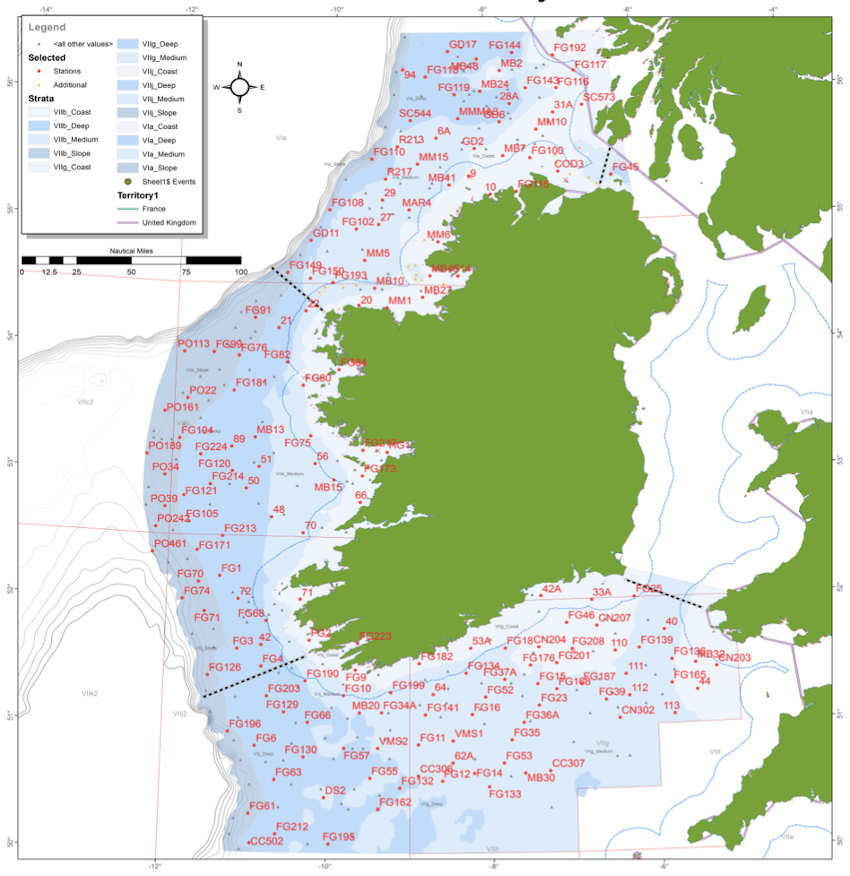
The vessel will be towing a high headline GOV 36/47 demersal trawl during fishing operations.
Co-ordinates and approximate locations of these hauls are included in Marine Notice No 48 of 2020, a PDF of which is available to download below.
The Marine Institute requests that commercial fishing and other marine operators keep a 2nm area around the tow mid-points clear of any gear or apparatus during the survey period between now and October and Thursday 10 December.
This survey follows the annual Irish Anglerfish and Megrim Survey which was conducted off the West, South West and South Coasts this past February and March.
Captive Salmon "Not a Substitute" for Wild Spawners, Research Suggests
New research led by scientists at University College Cork (UCC) which uses genetic fingerprinting techniques indicated that captive-born salmon are far less successful at reproducing as wild salmon spawning in the same river.
“We looked at the lifetime reproductive success of salmon spawning naturally in the wild,” joint lead author of the study Ronan O’Sullivan of UCC ‘s school of biological, earth and environmental sciences said.
“ So for each adult fish that returned to the river from the sea, we counted up the total number of offspring they produced across their lives that themselves survived to spawning age,” he said.
“We used a genetic pedigree coupled with four decades of salmon data from the Marine Institute’s research facility on the Burrishoole catchment in County Mayo. The results show that captive-bred fish that are deliberately or inadvertently introduced into the wild contribute fewer offspring to the next generation than wild fish, and therefore are not a substitute for natural wild spawners,” he said.
“Thus, they do not enhance the conservation status of naturally self-sustaining salmon populations,” he said.
Dr Paul Connolly, Marine Institute of Ireland chief executive officer said that his organisation welcomed the use of Marine Institute data to “answer a question of international significance that is relevant to conservation efforts for the culturally iconic Atlantic salmon”.
“ This analysis underlines the importance of having long–term biological data to allow management decisions to be based on the best available scientific evidence,” he added.
Further research is needed to work out exactly what is happening when the wild and captive salmon mix, UCC says.
However, it says the research team suspects that hybrid offspring produced by matings between captive and wild parents are genetically less well-equipped to deal with life in the river.
If true, this means that the widespread release of captive animals into the wild might actually do more harm than good in many cases, UCC says.
It says the research team comprised an international group of collaborators based at University College Cork, the Marine Institute, Queen’s University Belfast, the University of Helsinki and the University of Edinburgh. Their research findings are published in the prestigious journal Proceedings of the Royal Society B.
The research is available freely via Open Access here
2021 Budget Provision for Construction of €25 million Marine Institute Research Vessel
The Department of the Marine's 2021 budget estimate announced today provides some €13 million in increased funding for the continued promotion of the environmentally sustainable development of fisheries, aquaculture and the wider seafood industry.
This brings the total funding for the Sea Fisheries Programme to €151 million. This sector supports some 16,000 direct and indirect jobs in the coastal communities.
The 2021 provision will allow the Marine Institute to progress the construction of a new €25 million modern research vessel and provide additional funding for the development of fisheries harbours.
New Survey Asks Public To Share Views On Irish Seascapes
The people of Ireland are being invited to share their views on Irish coastal seascapes.
And the feedback gathered will inform Ireland’s Seascape Character Assessment Report, a key technical study for the National Marine Planning Framework.
The new survey follows an online poll this past summer to help classify and describe the essential character of Ireland’s coastal areas and communities.
The responses gathered have informed a draft assessment on which the Marine Institute is now seeking public input — from today, Wednesday 7 October, to Friday 30 October.
“Seascapes are very much about the relationship between people and place and how humans have settled and interacted in and along our coastline — from the earliest inhabitants on this island right up to today,” said Caitríona Nic Aonghusa, manager of marine spatial planning at the Marine Institute.
“By identifying, classifying and describing our seascape character in a holistic way, we can provide a baseline to better inform the planning and management of our seascapes.”
In addition to the public survey, a series of online workshops will be held for those interested in further discussion of the draft assessment.
These will take place next week, on Monday 12 October from 2pm–3pm and Tuesday 13 and Wednesday 14 October from 8pm–9pm. To attend any of these online workshops, email [email protected]
And to celebrate and raise awareness of International Landscape Day on Tuesday 20 October, the Marine Institute is also encouraging people across the island of Ireland to share photographs of seascapes on social media.
Post your photos of Ireland’s seascapes on that date on social media with #IrishSeascapes and tag the Marine Institute on Twitter or Facebook.
Marine Institute Scientists Join ‘Mission Atlantic’ To Map & Assess Sustainable Ocean’s Development
Marine scientists from Ireland will join an international group of ocean experts in a project to map and assess the Atlantic Ocean’s current and future risks from climate change, natural hazards and human activities.
Mission Atlantic brings the Marine Institute together with scientists from Europe, Brazil, South Africa, Canada and the USA to develop the first Integrated Ecosystem Assessments (IEAs) at the scale of the Atlantic basin.
Using high-resolution ocean models; data collected with marine robots and acoustic sensors; artificial neural networks; risk assessment methods; and advanced statistical analysis, the international partnership will assess the pressures imposed on the Atlantic’s marine ecosystems — especially those related to plankton and fish distribution — and identify the parts most at risk.
The Marine Institute says this “unique” project — funded by a €11.5 million grant from the European Union’s Horizon 2020 programme — will engage scientists, managers of marine resources and other stakeholders in balancing the need for environmental protection with sustainable development.
‘Mission Atlantic will contribute to a better and more sustainable future for life on Earth’
“In an era of rapid transformations affecting our societies and our lives, we are asked to provide the scientific knowledge necessary to face future challenges and to guarantee a sustainable future for the next generations,” says project co-ordinator Patrizio Mariani.
“By studying the complex Atlantic Ocean ecosystems, Mission Atlantic will contribute to a better and more sustainable future for life on Earth.”
The Marine Institute is leading the IEA approach for each of the seven case study areas throughout the Atlantic. In the Celtic Sea, this will be underpinned by regional data from INFOMAR, Ireland’s ongoing seabed mapping programme.
Marine Institite chief executive Dr Paul Connolly said: “The comprehensive mapping of the depth, character and benthic habitat of our seabed is critical to assess change, manage resources and risks, and to predict understand and realise the potential of our marine resource.”
Mission Atlantic will also focus on improving education, professional development opportunities and maritime policy in countries that border the Atlantic Ocean, north and south.
More information on the project will be available soon at www.missionatlantic.eu
Galway Explorers Team Hits The Beach For ‘World Cleanup Day’
The Marine Institute’s Explorers Education Programme team has joined marine scientists, teachers and educators across Europe and North America to hit the beach to celebrate World Cleanup Day, which took place this year last Saturday 19 September.
During the month of September, members of the EMSEA-Atlanic network from Ireland, Azores, Portugal, USA and Canada have been taking part in local beach cleanups “with a focus on highlighting some of the prominent litter items frequently found on our seashores around the Atlantic”, according to EMSEA board member Evy Copejans.
As well as bringing communities together to learn more about marine wildlife and the marine environment, beach cleanups are also opportunity to find the most extraordinary things washed up on the shore.
In the past, EMSEA members have found messages in bottles, rubber ducks, bowling balls, and mini-boats that have drifted on currents across the Atlantic.
And they are sharing any oddities and treasures discovered on beaches on social media with the hashtags #seawhatifound and #EMSEAAtlantic.
“On the west coast of Ireland, in Galway we often find buoys, fishing gear and sometimes items from halfway across the world,” said Padraic Creedon, outreach officer at Galway Atlantaquaria.
Explorers’ Cushla Dromgool-Regan added: “We are connected by the ocean in so many ways and recognise the importance of working together to ensure the ocean is sustained for our families, friends and future generations.
“Coastal clean-ups help us raise awareness about the connections we have and the influence the ocean has on us, as well as the impact we have on the ocean.”



























